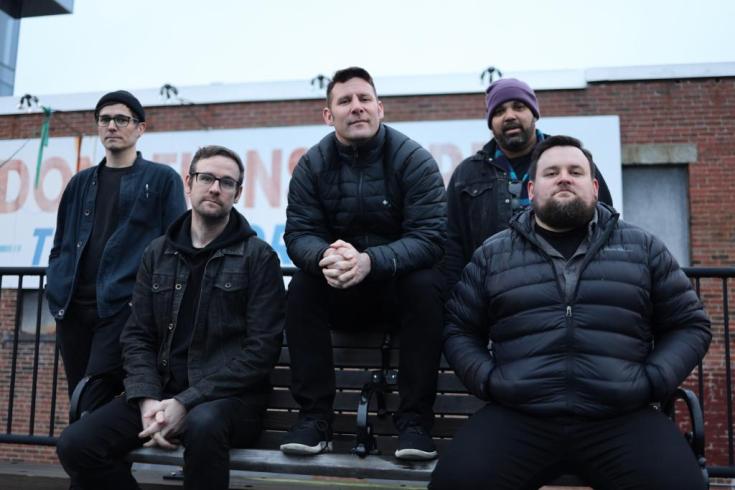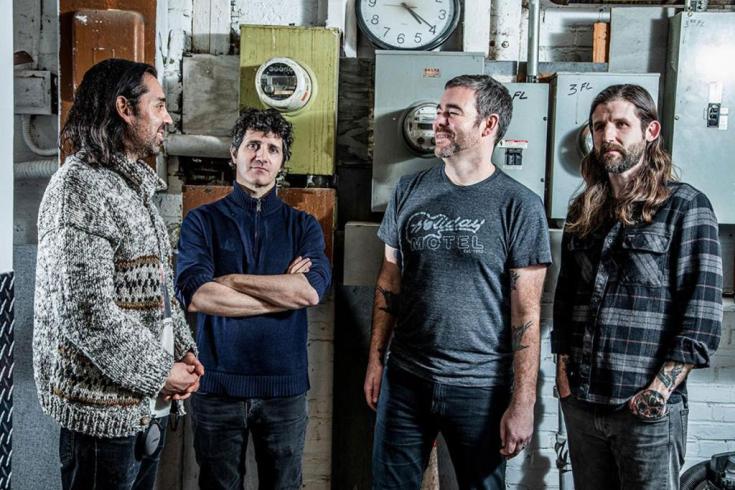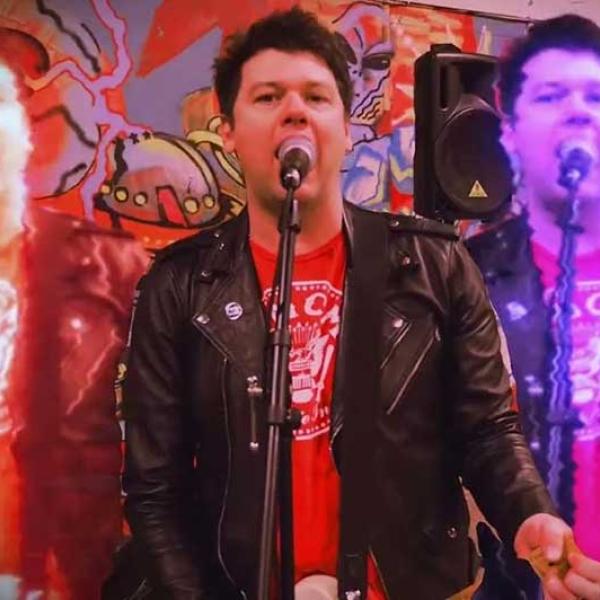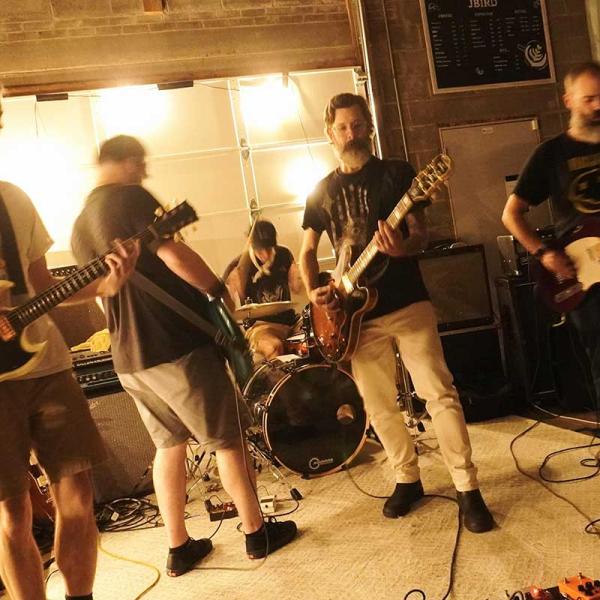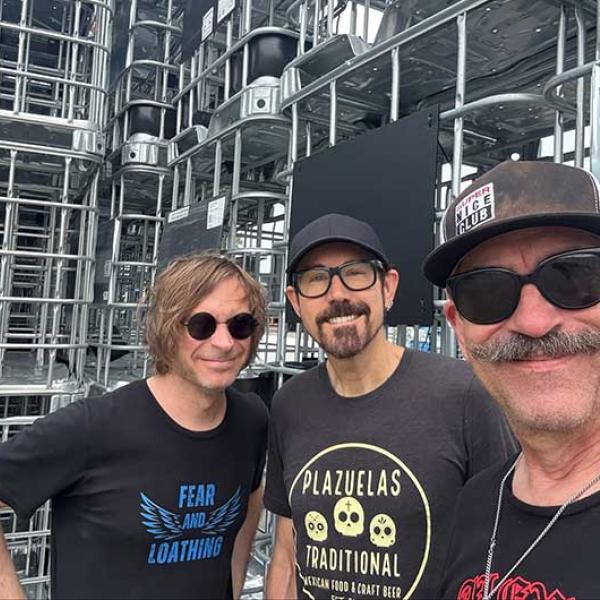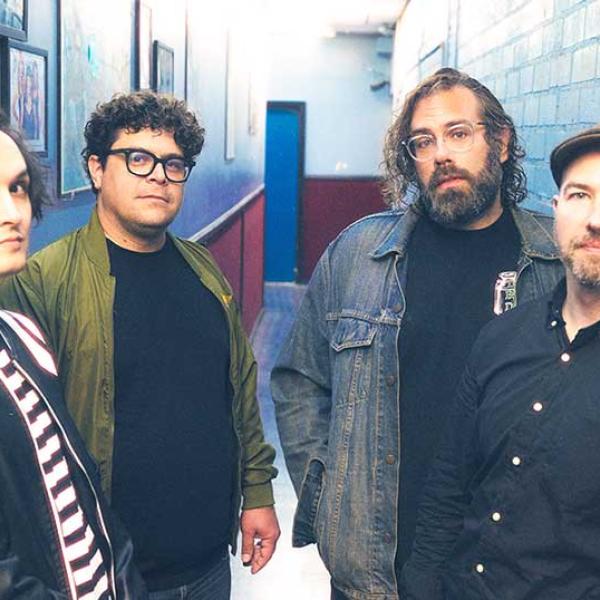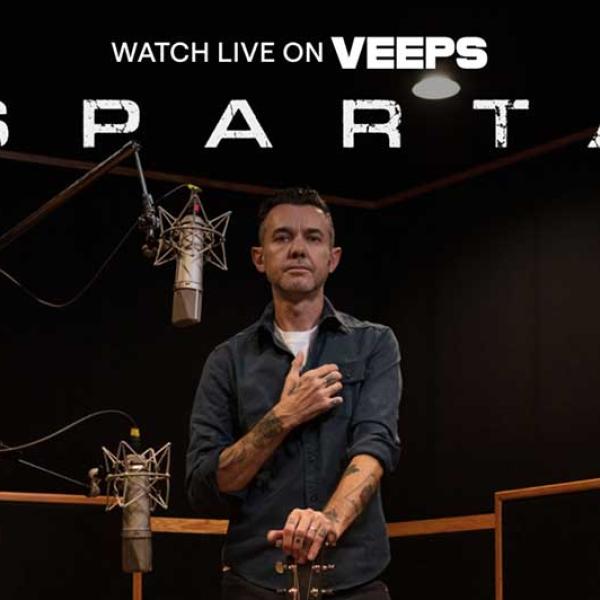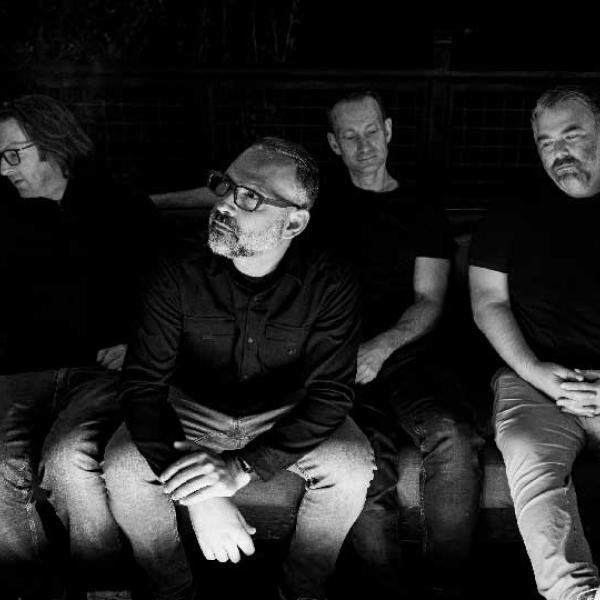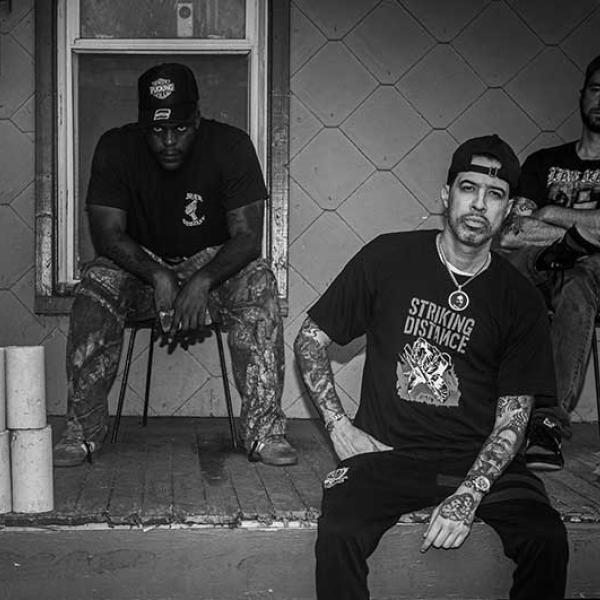Features
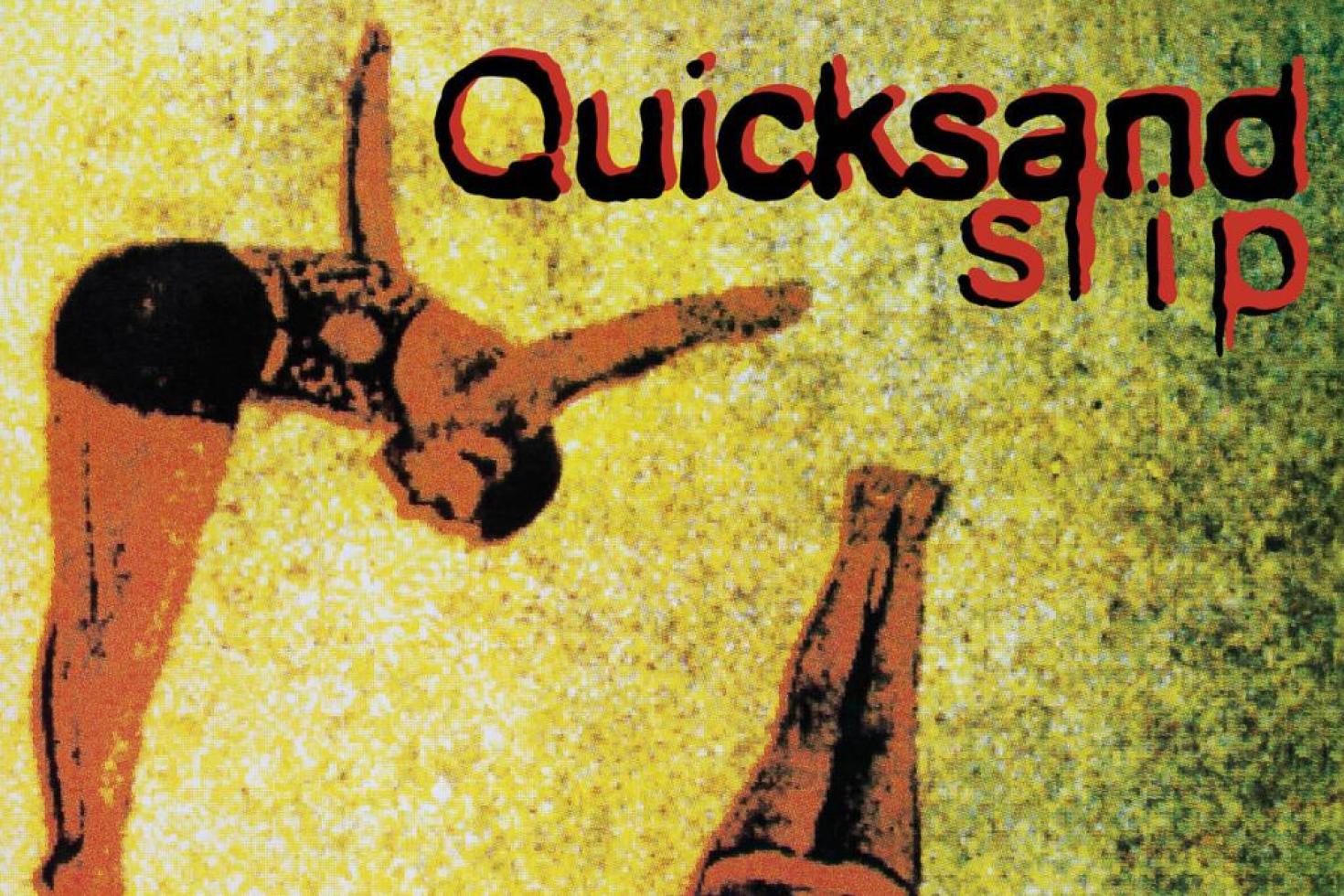
When I first heard ‘Slip’ back in 1993, I was immediately blown away. It was a completely different beast from what I was listening to at the time and blended heaviness and melody in a way that I hadn’t heard before.
Quicksand’s members - vocalist/guitarist Walter Schreifels ( Gorilla Biscuits and Youth of Today), guitarist Tom Capone (Beyond, Bold), drummer Alan Cage (Burn, Beyond) and bassist Sergio Vega (Collapse, Absolution) - had already done more than their part to light the New York hardcore scene on fire, but completely flipped the script with ‘Slip,’ which was somehow an amalgamation of everything that was cool from different genres, neatly wrapped up in 12 songs.
30 Years down the line, both ‘Slip’ and the band responsible for the album are still as relevant as they were back then. Seamlessly bridging the New York Hardcore scene that Quicksand’s members cut their teeth on and the burgeoning sound of the 90s', ‘Slip’ is one for the ages and handed bands like Deftones, Glassjaw, Title Fight and hundreds more the blueprint of what post-hardcore can accomplish. We recently got the chance to sit down with Walter Schreifels and Sergio Vega to talk about the album and the 30th anniversary edition that will be out later this month on Iodine. Completely remastered for vinyl using the original 1993 master tapes by Jack Shirley (Deafheaven, Joyce Manor, Jeff Rosenstock), this edition includes bonus track “How Soon is Now?” and is available in several variants.
PRT: This year marks the 30 year anniversary of ‘Slip’. What does the album mean to you personally?
Walter: It's just amazing that it still has some resonance. When we made it, we were very much into what we were doing and wanted to make something really great. But we obviously weren’t considering that we'd still be talking about it now. To me, that's patting ourselves on the back a little bit, but I'm proud of it.
Sergio: I don't often ponder things like that. But, since it's come up with this anniversary, it reminds me of walking around my neighborhood in Brooklyn with a walkman and listening to the mixes and how exciting that was.
PRT: How does the album rank between all the other musical projects that you have been involved with?
Walte: It holds a very special place. It was us going from something that we were doing as kids to doing it in a more serious, professional kind of way. We were aware of how expensive the studio was, the promotional stuff and the machine behind us. For me, it was like, “Okay, we're doing this for real now. I'm not working at the health food store anymore.”
Sergio: Yeah, agreed. It's impossible to rank things, but it has a unique place for the reasons that Walter mentioned. The amount of time that we got to dedicate to it was something that I had never experienced before. It became the center of your existence. That only happens once, and it's a very intense feeling.
PRT: When you started Quicksand, you had all played in hardcore bands. Was it the idea from the start that Quicksand should sound different?
Walter: Like with most scenes, there were little groups in the hardcore scene. They get together, it blooms, and then it falls apart a little bit. I think we were, not so into it anymore. We wanted something more. We were very consciously trying to do something different. But we learned how to play in the hardcore scene, so we still had a lot of that in us.
Sergio: It definitely became about wanting to push the envelope and doing something fresh and exciting within our community. We wanted to step out a little bit and add some different things.
PRT: Page Hamilton once told me that he didn’t think that Helmet could have started anywhere else or at any other time. How much of an influence has New York in the late '80s, early '90s had on Quicksand's sound?
Sergio: I think that how we as a band love art, music, our surroundings and our culture, we could have started at some other time. It obviously wouldn't have sounded exactly the same. But I think that we have approaches that are our own. Walter and Alan have voices and a certain way of playing that's uniquely theirs. So, while we would be drawing from different references, I think we'd be able to do something cool, no matter when.
Walter: But could we have been a good band in some other city? Yeah, I think we definitely could have, but there's something in our music that is playing to the intimacy of New York that gives it a real ... To what Page was saying, it's a special ingredient. It doesn't always work in your favor, but it does have an influence.
Sergio: Totally. We could have started at some other time, but not another place. Definitely New York. Any other place would be radically different. New York has this randomness and proximity where you're exposed to things, whether you want to or not. And it becomes part of your DNA.
PRT: I read an older interview where, Walter, you talked about how the band's sound was a mix of all the aggressive stuff that came out of New York, but that you also wanted to implement something more cerebral. Was that a difficult balancing act at first?
Walter: Because we were playing to hardcore people, I guess there was a feeling and a natural proclivity towards making something that would move the crowd. Aggressive only in the sense that it would move the crowd, not inspire violence. Cerebral, well, I don't know. I'm being cerebral now. It's sort of a weird thing to say. Hardcore is awesome for its directness and clear narratives. I guess I wanted to play with things, be more obtuse in some ways, create dissonance. Create sounds where you don't have to be good at guitar to create an emotional feeling.
I definitely took a lot of influence from bands like Fugazi, My Bloody Valentine and Sonic Youth, where you're creating guitar sounds that aren't necessarily about technique. Lyrically, there's some things that are just brought in for sound and for effect. It's not necessarily a clear narrative like there would be in a hardcore song.
PRT: Probably not the most original question, but was the name Quicksand inspired by the sound of the band?
Walter: It probably informs the sound of the band, more than the other way around. When we first started playing, we were just letting the guitar open, playing with noise and space in a way that was different from what we had done before. Quicksand just sounds very elemental. But it also sounds like there's something kind of threatening there, like a slow sort of pull. So, maybe that informed us, but it wasn't like we had band meetings about it.
PRT: You had all played in other bands previously. Did you experience any pressure or expectations when you first started Quicksand?
Sergio: Personally, no. For me, the exciting thing was that our scene in New York had so many sub-factions. And I felt like this didn't really speak to any of that. It was just people who got together who wanted to do something cool and different. There wasn't any pressure in the sense of what is this going to sound like, or how successful will it be. It was just excitement. It was like, "Oh, you're going to be playing with Walter and Tom and Alan." The idea of us coming together was exciting to my friends. It just felt supportive.
Walter: Yeah, I think because I was coming from being the guitar player in Gorilla Biscuits and playing in Youth of Today, I had some sort of concept of who I was and what I was doing. And it was exciting to play with that. Not that there was a whole bunch of people so curious about what I was doing or anything. But I thought that it would be interesting to play off this set idea of, well, these guys are from the New York hardcore scene. I thought what we were doing was really good and felt excited about it. I’m sure there were people who thought, "Well, this isn't what I expected, or this isn't hardcore," or whatever. But, I had a lot of confidence that those opinions would be the minority.
PRT: You first released a seven inch in 1990, I think, and ‘Slip’ didn't come out until '93. Was that you taking your time for the album or just outside elements that made it take longer?
Walter: I didn't think of it as such a long time. I guess a year of it was probably where our music was kind of more hardcore-ish. Then, we just got very into shoegaze and Sonic Youth. That's also when we got interest from major labels. So, then that was a whole year of crap to make a record. Then, the record came out the following year. If you asked Alan, our drummer, he probably would've been like, "We should have been releasing material the entire time." I couldn't say that he was wrong about that, but we were changing and going through all kinds of stuff. We just weren't really committing it to recordings.
Sergio: I think after our initial batch of songs on the EP, we went through playing shows and developing. It didn't feel like long. It didn't feel particularly conscious either. We knew what we didn't want to do. That kind of created the framework for what we were going to be. When you don't have such set parameters to funnel through, you just take the time to develop it and take the time to do things that you really feel represent what you're going for. The target may move over time. So, it never felt like the three years was long. I felt like we were very busy, very active, playing, developing. I recently watched a lot of footage from that era. Most of the stuff didn't live. Some of the stuff kept morphing and changing dramatically. I don't see another way to have done it. I'm glad that it went down the way that it did.
Walter: It also could have been December, 1990 and then January, 1993, which really only makes it two years. Let's consider that possibility, all right, okay? (laughs)
Sergio: Yeah, two years is nothing.
PRT: Do you still remember what the first song was that you wrote for ‘Slip’?
Walter: Well, we ended up using two of the songs off the EP (‘Omission’ and ‘Unfulfilled’). If you take those out, I honestly don't really remember. I think "Dine Alone" and "Can Opener," because they ended up being our demo tape that Polydor signed us off along with the EP. And we probably had a bunch of riffs. I remember that "Fazer" went through all kinds of different ways of us playing it. That's maybe why I ended up titling it "Fazer". I don't think we ever really settled in on one way until right before the album was recorded.
Sergio: Yeah, I recently listened to three or four different versions of "Baphomet" that we played live over the years.
Walter: Yeah, we kept toying with stuff. We were just getting into so many different kinds of music. Also, music was shifting so much at that time. When we were in hardcore, it was a little easier to follow because we were so close to everyone that was doing it. Whereas our music taste just went rampant in that period of time.
PRT: Was the album in general an easy one to write, except then for "Fazer?"
Walter: I wouldn't even say "Fazer" was hard. It's just that we just kept shifting around. A lot of the stuff would sound good in the studio, and then we would return to it and maybe change a little bit here and there. When it finally came time to do the record, then it just all had to happen. As long as we didn't have a recording date, we were constantly messing with everything.
Sergio: It's less about whether it was easy or hard. It's more about that we were in a mode of experimentation. What are we? What are we not? What do we want to do? What's exciting? That was constantly shifting. But once we had a recording schedule, things had to crystallize.
PRT: And once you had a studio date, how finished was the album? Did it still change a lot in the studio?
Walter: It was the first time we ever did pre-production. We had a producer, so we had another person there assessing what was going on. And by the time we went in the studio, we had pretty much agreed upon structures of the songs. I had lyrics to some, but not a lot. I had a feeling where things would go, what would be the chorus-y type of part, but the lyrics were important and I wanted to sing them to the music. So we actually recorded all the music and then took some time off, during which I wrote all the lyrics.
PRT: The album lists two producers. How did that work exactly?
Walter: The first guy that we had, Ted Nicely, did pre-production with us. It was really helpful having that opinion to get us to where we had all these songs. But, once we got in the studio, we weren't working as well together. So, we opted to go with Steven Haigler, who was the engineer. He really carried the whole record home.
PRT: And how does Don Fury figure in?
Sergio: We did our EP with Don Fury and went back to him to do some tracking in the midst of the record. I think it was guitars mostly.
Walte: Oh, no, we recorded all of "Head to Wall" and "Lie and Wait" at Don Fury's where we had recorded our demo. I think I really pushed to work with him. The record label was cool about it and they let us do it. I really think those two songs are great for the record.
PRT: Were there things that you learned in the writing and recording of this album that you already knew you wanted to do differently on the next album?
Sergio: I learned that I love recording, being in an actual studio. Especially with Steven Haigler and his approach to recording and sound and performance. It planted a seed in me that over time inspired me to learn how to record and learn how to produce. I always thought of the studio as just something you do. You went in there because you had some songs that you wanted to get out into the world. But that made me love the act of recording as its own reward.
Walter: Just having that experience of going from basically a home studio to working in these fancy, really amazing studios and getting a feel of how to navigate. It's like driving a small car to driving a truck. You know what I mean? The principles are the same, but it takes a minute to feel comfortable.
Sergio: And for myself, it was mostly the time that we spent there. You're thereall day every day, as opposed to in my experience, being in and out of a place very quickly. You maybe run in for the mix again. But having a place where you're locked out for an extended amount of time and you're just kind of steeped in this world, that’s when I started learning. For me, it was truly exciting.
PRT: For the anniversary edition, Jack Shirley remastered the whole album. When you first heard the new version, was there something new that you discovered about the album as well?
Walter: I didn't listen that much, to be honest. By the time a record is out there in the world, I've listened to the thing 50,000 times. I don't need to hear it again. I did listen to the master, just to see if it sounded good. The thing is, if you start listening to old things, you can go into critiquing it because there is some distance. And then every album you have made, there will be something like, "Shit, I wish I had spent more time with that, or I spent too much time with that.” I’d start to get into that mode, so I just don't bother, really.
Sergio: Yeah, same. Getting too caught up in something that's happened is not necessarily productive.
PRT: The reissue also comes with the Smiths cover that you guys did. What made you want to cover that song in particular?
Sergio: At the time, we all had a lot of things that we all individually liked that weren't specifically hardcore. We all had our own tastes, but The Smiths were one of the bands that we all agreed on. It was a fun thing to record and something unexpected.
Walter: Yeah, people in our circles didn't know The Smiths. Or, if they did, they were low-key into it. And our version is pretty different from The Smiths' version. So, it's definitely an interpretation of it.
Sergio: I think it was the first time I ever really did a cover in that way. Taking something and re-imagining it to a certain extent makes you learn a lot about song structure. You get to be creative within someone else's boundaries.
PRT: I was also wondering how hands-on you guys were now with the bonus material on the reissue. Sergio, you already mentioned going through a lot of footage.
Sergio: Oh, I was not hands-on at all. I've always been an archivist of our stuff, but to be honest, that was all Iodine.
Walter: They did a great job. I definitely appreciate all the work that Iodine did, because they made this a very special packaging. We got to come in at the last minute and go "Oh, wow, this is great." Iodine really showed a lot of love for this record.
PRT: There's one edition of the album that comes with a book that's full of contributions from other bands who wrote something. Did you read that?
Walter: It's cool to see that your peers respect what you've done, that it's meant something to them and that it's inspired some people to do great things. You want to be in that conversation as an artist.
Sergio: I think that's the important thing. You get into music. You feel like music is a language, and there's communication going on between artists and between people who are listening and how it all affects each others' lives. To be a part of something that adds to the conversation, and that can inform it as much as we've been informed, it's nice.
PRT: What is the biggest compliment that you have ever gotten about ‘Slip’?
Sergio: Any affirmation is good. If you look at how many people pursue art or creative endeavors, simply to have someone listen at all and then take the time to affirm what you've done and appreciate what you've done, that’s great.
Walter: Having your peers who you respect say that they like your work. That's a cool feeling. Then, there's people that you just meet at a show and say, "Hey, this record got me through a time or inspired me to want to do something." That stuff is amazing. When your record has that place for other people, that's insane. So many things have to come together for that to work. It has to be good. It has to come out at the right time, and all these different factors that you can't really control. So, there's a certain magic to that.



